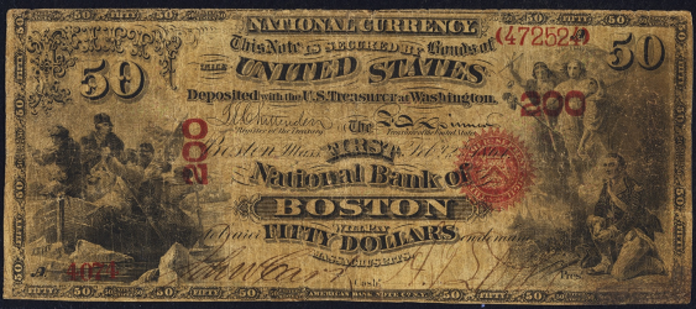Fifty Dollar Notes › Nationals › 1863 Fifty Dollar Original Series National Bank Notes › New York Charters › 1863 $50 Kinderhook New York National Union Bank
Get Value Now
| Item | Info |
|---|---|
| Series | 1863 |
| Charter | #929 National Union Bank of Kinderhook, New York |
| Year Chartered | 1865, 944 Banks Chartered |
| City Info | Kinderhook is a town in the northern part of Columbia County, New York, United States. The population was 8,498 at the 2010 census, the most populous municipality in Columbia County. The name of the town means "Children's Corner" in the language of the original Dutch settlers. The name "Kinderhook" has its root in the landing of Henry Hudson in the area around present-day Stuyvesant, where he was greeted by Native Americans with many children. With the Dutch Kinder meaning "child" and Hoeck meaning "bend" or "hook", the name literally means "bend in the river where the children are". Source: Wikipedia |
| Similar Cities | If your note doesn't match try: 1. Kinderhook, New York - National Bank of Kinderhook |
| Seal Varieties | Red with rays |
| See Also | If your note doesn't match try: 1. 1864 $50 Compound Interest Treasury Note 2. 1861 $50 Interest Bearing Note 3. 1863 $50 Interest Bearing Note 4. 1864 $50 Interest Bearing Note 5. 1865 $50 Interest Bearing Note 6. 1862 $50 Legal Tender |
| Other Info | 1. Value depends on notes known for charter, condition and market demand. |
| Neat Fact | Plate letters A-C for $50 Notes, A for $100 Notes (Friedbergs, 20th Ed. P 99) |
No Obligations Offers and Appraisals
Please submit a good photo or scan. It will be identified and evaluated. Understand there may be subtle differences between the image you see above and your note. Signatures, design, markings and note condition will determine the offer price. Notes in Uncirculated or better condition receive the best offers.
Appraisals can be estimated for wholesale and retail prices. Wholesale is what dealers typically pay. Retail is what a collector might pay. Retail is slightly higher in most cases.
Please visit this page for USA Paper Money Reference. Do not treat this page as a reference guide, it is for appraisal and acquisition purposes only.
